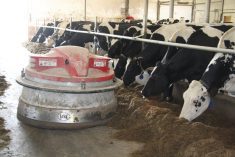Canada should have been much more aggressive in its post-BSE negotiations with South Korea, says the Canadian Beef Export Federation director in that country.
That includes taking a complaint to the World Trade Organization much sooner.
Amos Kim told the Canadian Cattlemen’s Association semi-annual meeting in Regina that Canada negotiated market access in good faith.
“We had good will and then we were expecting that government to show that same level of good will,” he told reporters. “When they are not showing good will, then we should have been decisive in our actions.”
Read Also

Manitoba extends Crown land rent freeze
Manitoba government links the continued rental rate freeze on grazing and forage leases to economic and environmental challenges facing the industry
Kim said South Korea convinced Canada that once the border opened to U.S. beef, Canadian beef would follow.
South Korea never intended to keep its promise and Canada was naive to believe it, he said.
Canada should have done its own heavy lifting.
“I think now we are realizing it,” he said. “We cannot repeat that kind of mistake again.”
South Korea allowed American beef to enter its market for several reasons, including the country’s strong military, political and economic ties with the U.S. Canada doesn’t have the same leverage.
Kim said Canada’s decision earlier this year to request a dispute settlement through the WTO was a good move. Although South Korea could and did oppose the first request, a second was scheduled for later this month.
“Korea is not able to turn this request down again,” Kim said. “If a dispute settlement panel is set up, there is still room for compromise.”
The South Korean government is well aware that if it loses at the WTO level, it will have to grant wider access not only to Canada but to other countries.
“Probably I’m thinking they might be interested in non-WTO solutions,” he said.
Federal agriculture minister Gerry Ritz said, in hindsight, it was easy for South Korea to stall and hold Canada off. There now appears to be a willingness to settle the matter.
“They know how serious this is and they know that they’re not on the right side of the issue when they accept American beef,” he told reporters at the meeting.
Ritz said Canadian beef has likely already entered the country via the U.S.
Prior to BSE, in 2002, South Korea imported about 17,000 tonnes of Canadian beef, worth about $60 million. That total was more than twice as much as China, Taiwan and Hong Kong combined.
The U.S. had 65 percent market share.
Since BSE, Australia has become the largest supplier at about 60 percent.
Kim recommended a more co-ordinated Canadian approach to getting back into the market and less reliance on the Canadian embassy.
Canadian Food Inspection Agency officials should visit more often, he said, and the new market access secretariat should be involved.
“We need to seek a firm solution both within and outside the WTO process at the same time,” he said.
Meanwhile, Ritz said bilateral trade agreements are the way to go given the unlikelihood of a concluded WTO agreement anytime soon.
“I think anybody that says we’re going to have signed, sealed movement by 2010 is dreaming in Technicolor,” he said, adding he would be shocked to see a ministerial meeting, proposed for later this year, actually happen.
He said nothing he has seen so far in WTO proposals looks good for Canadian agriculture.
“We’ll do what’s in the best interest of all of Canadian agriculture but I haven’t seen that in any of the texts that I’ve seen yet,” Ritz said.















